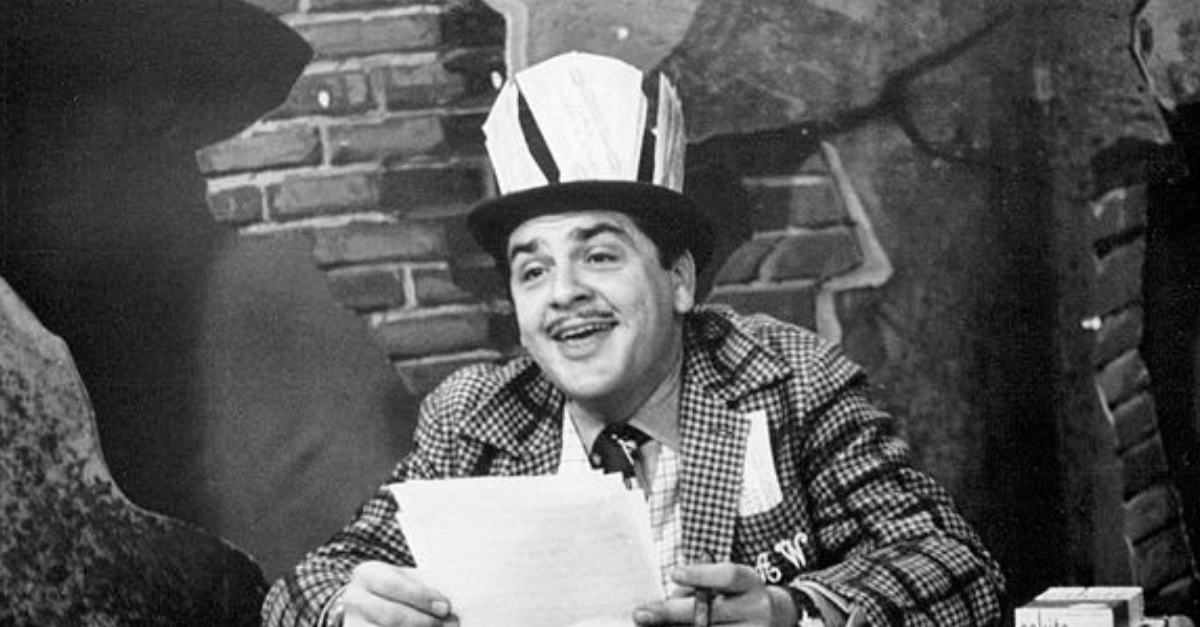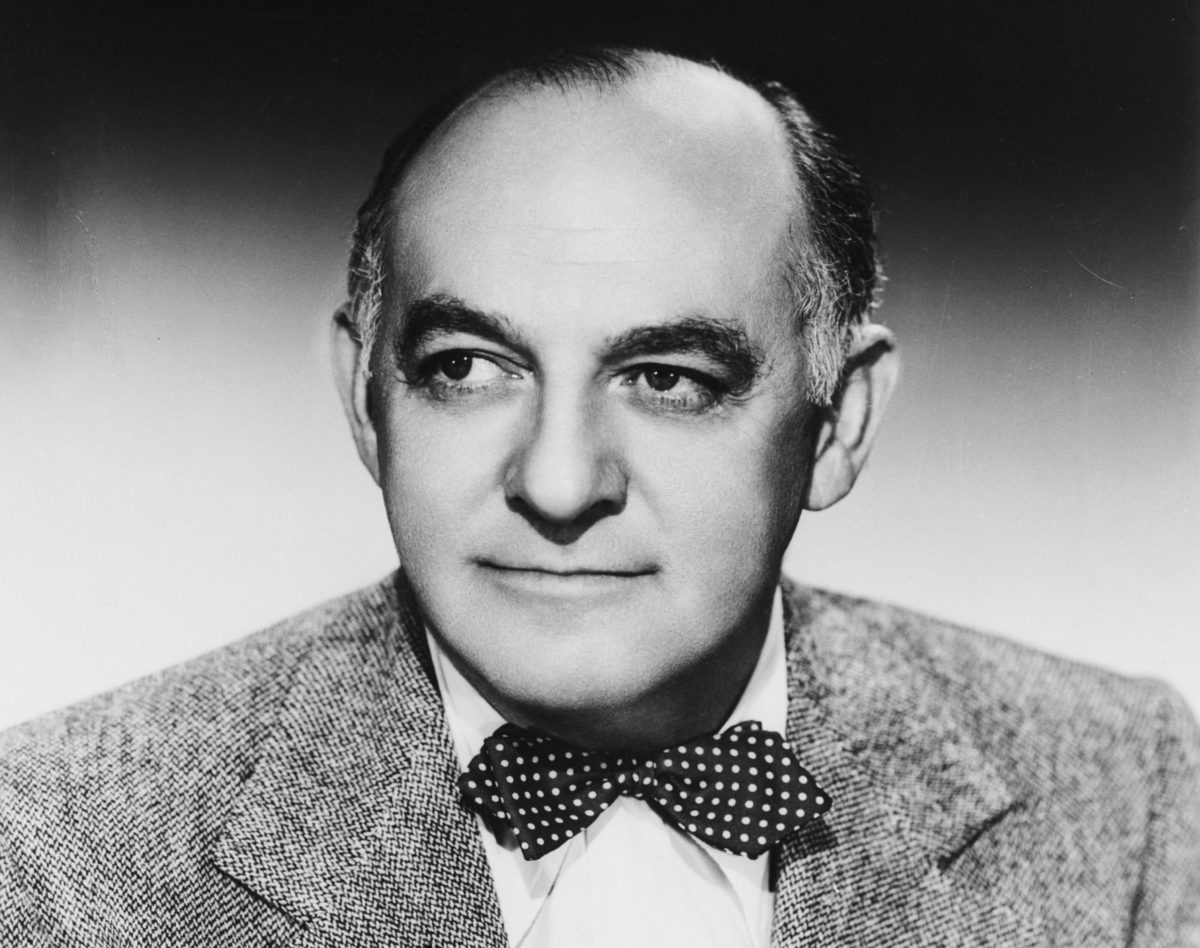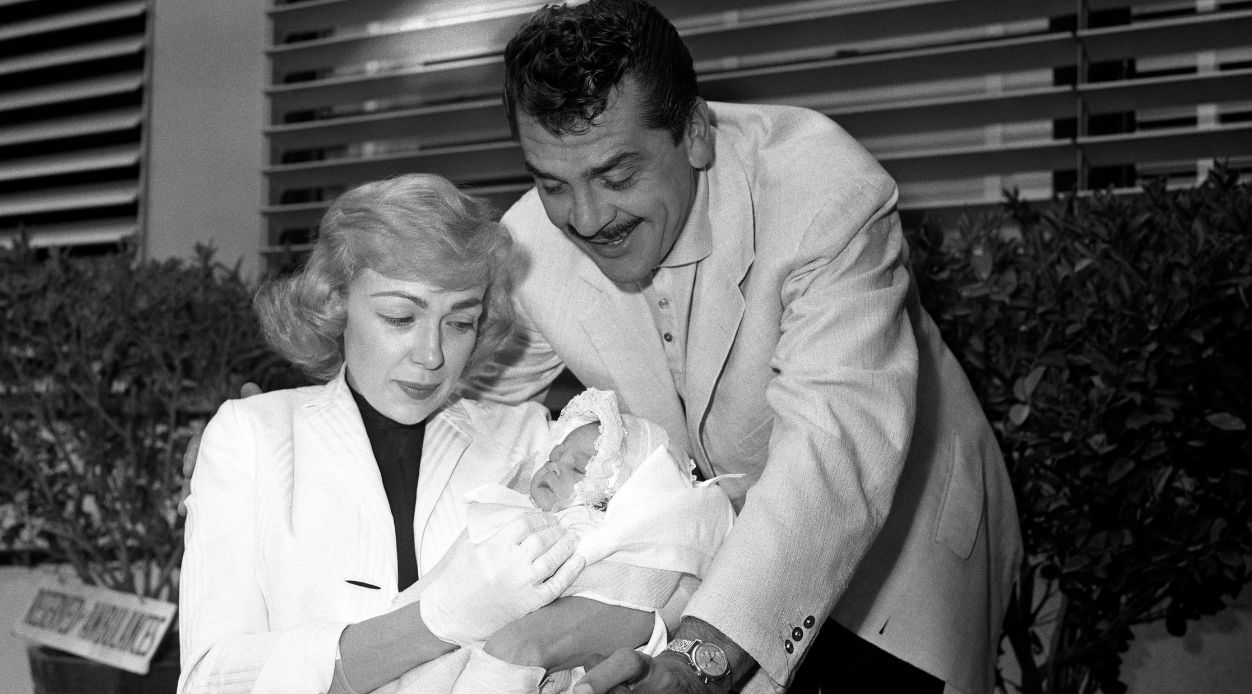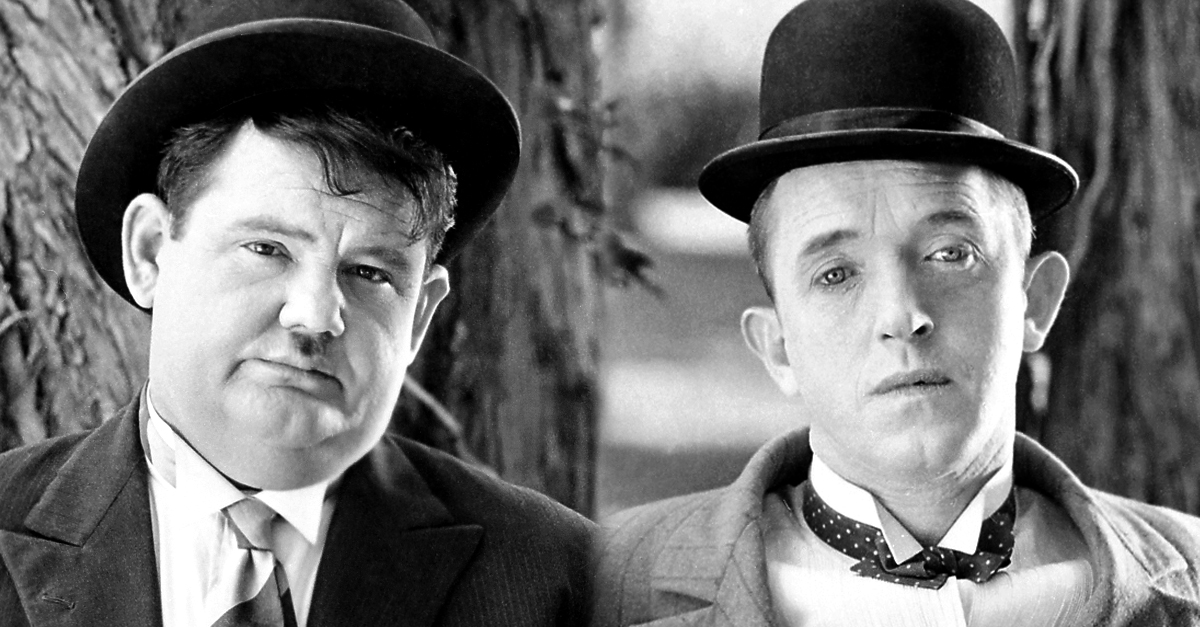Ernie Kovacs: Lost To Time
Ernie Kovacs was a comic hero to the likes of Monty Python, Chevy Chase, and Johnny Carson. More than that, he created some of the most memorable comedy during the classic age of television in the 1950s. Yet even those who grew up with him hardly know his name today—because underneath the laughs, Kovacs’ story is one of shock and tragedy.
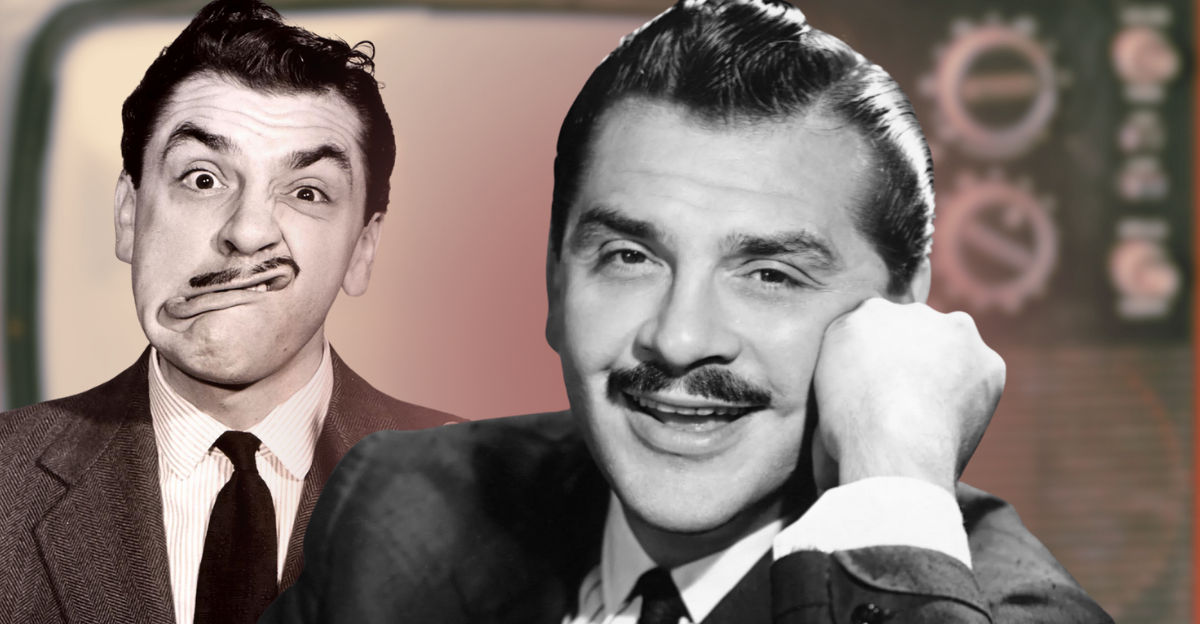
1. He Was An American Tale
Born in New Jersey in 1919 to a hard-working Hungarian immigrant father, Ernie Kovacs didn’t seem at first like the kind of boy who would grow up to become a madcap comic genius. Nonetheless, his high school drama teacher saw the spark in his student and helped Kovacs get an acting scholarship in New York City.
But Kovacs’ early promise was nearly snuffed out then and there.
2. He Had A Close Call
Just two years after entering acting school, Kovac’s life took a turn for the terrifying. While in Vermont, he fell dangerously ill with pneumonia and pleurisy, and doctors were urging him to make his peace before he perished. Not only did Kovacs prove them wrong by surviving, this period also turned into a key moment for his comedy, and for his life.
3. He Had A Captive Audience
It took over a year for Kovacs to recover from his maladies, but he didn’t waste this time. Kovacs became famous around the wards he stayed in for his zany sense of humor and off-kilter antics, which he used to entertain the various doctors seeing him as well as his fellow patients.
The moment he walked out, he hit the ground running.
4. He Was A Daredevil
In 1941, Kovacs got a job as an announcer for the radio station WWTM, eventually becoming the station’s director of special events. He used his power for chaos. Over the next years, he pulled stunts like seeing what it would be like to be run over by a train (though he did escape the tracks at the last second) and taking flying lessons live on air.
Yet for all his pie-in-the-sky ideas, Kovacs was about to get very grounded.
5. He Got Hitched
In the summer of 1945, with his career and his health finally stable, Kovacs married Bette Wilcox, and soon had two children with her: An elder daughter named Elizabeth, who they called Bette, and a younger girl named Kip Raleigh, or Kippie. For a time, all seemed idyllic in the Kovacs household, and Kovacs’ next windfall only supported this.
6. He Put On A Bizarre Audition
By 1950, Kovacs thought he was ready to make the leap from radio to television, and took an audition with WPTZ, the local Philadelphia NBC affiliate. He did it in style. True to his madcap ways, Kovacs showed up wearing a barrel over his shorts. Best of all, it worked: they promptly gave him a slot on the promotional show Pick Your Ideal.
Still, television wasn’t radio, and Kovacs knew he had to adapt accordingly.
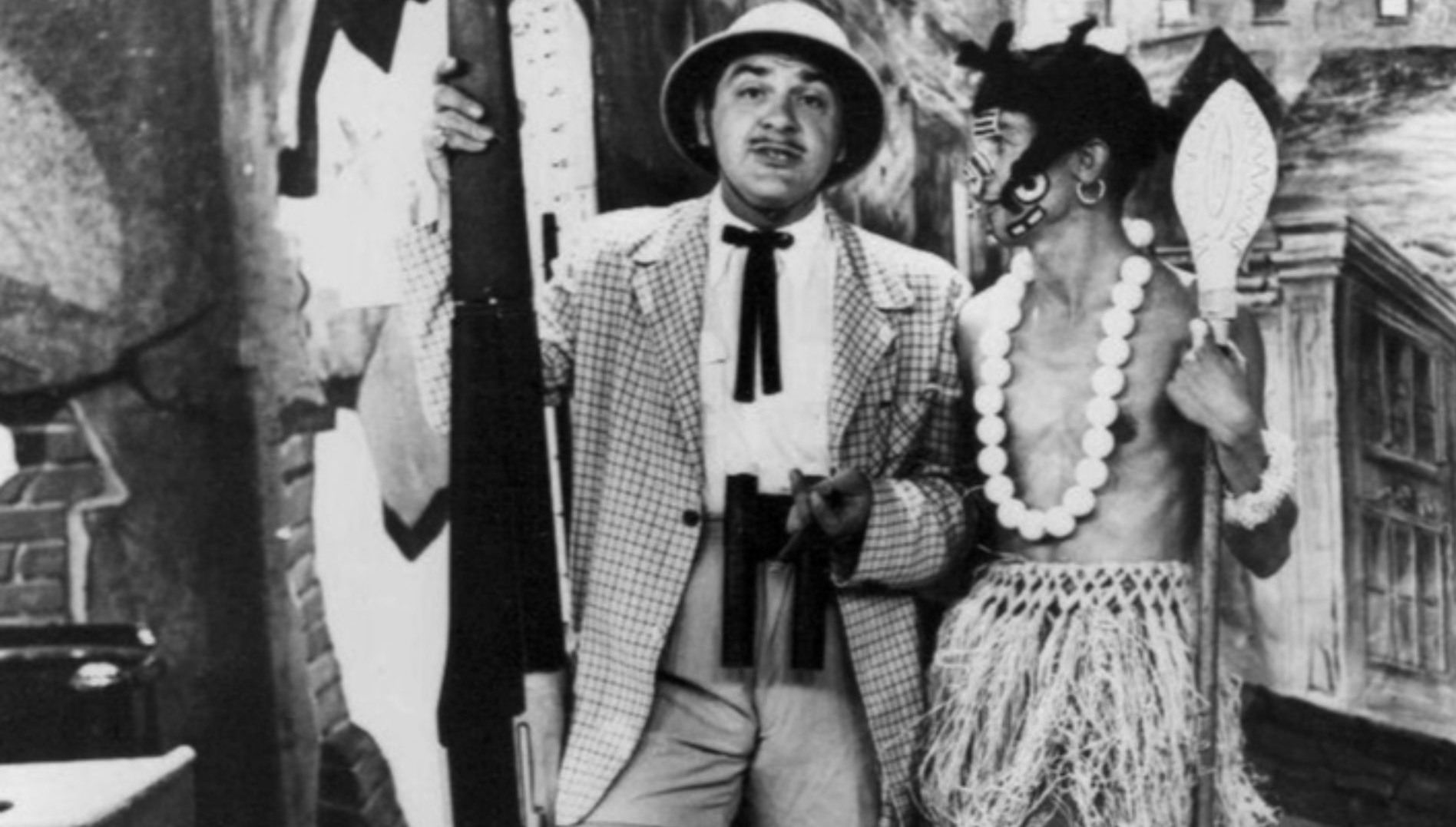 WCBS-TV, New York, Wikimedia Commons
WCBS-TV, New York, Wikimedia Commons
7. He Thought On His Feet
Kovacs was successful enough on Pick Your Ideal that the network began using him in other shows, particularly cooking shows like Deadline for Dinner and Now You’re Cooking. In these jobs, Kovacs learned to think on his feet. When one of his chef guests stood him up, Kovacs made his own dish, “Eggs Scavok” (Kovacs backwards), and seasoned it with cigar ashes.
But his real innovation was one we all take for granted today.
8. He Was A Television “First”
In November 1950, Kovacs made television history. He began on the show Three to Get Ready, which was the very first regularly scheduled morning show on a major market. In fact, it beat NBC’s The Today Show to the punch by more than a full year. And while executives doubted anyone would be up for the 7 am time slot, Kovacs, as always, found a way to draw people in.
 WPTZ-TVUploaded by We hope at en.wikipedia, Wikimedia Commons
WPTZ-TVUploaded by We hope at en.wikipedia, Wikimedia Commons

History's most fascinating stories and darkest secrets, delivered to your inbox daily.
9. He Played Pranks
Three to Get Ready was supposed to give the audience a basic slate of morning news and weather reports, but nothing Ernie Kovacs did was “basic”. For example, if the weather was supposed to rain, Kovacs would “recreate” this for the audience by getting up on a ladder and dumping water on the weather reporter. There was more where that came from.
10. He Went Wild
Kovacs had always been bursting at the seams with wild ideas, but on Three to Get Ready he really let himself run free. Some of his performances during this time are in the comedy pantheon of gags: He brought goats on set, worked camera angles to make it look like tiny women were walking on his arm, and ran down the streets of Philadelphia in a gorilla suit.
He was just getting started.
 General Electric Theater, Wikimedia Commons
General Electric Theater, Wikimedia Commons
11. His Set Was A Madhouse
Kovacs liked to pounce on any opportunity that came his way, which often gave his broadcasts at WPTZ an unpredictable, even dangerous quality. After all, Kovacs once got knocked out cold when a pie, with the plate accidentally still under it, got smashed into his face. Other times, Kovacs’ ideas were just too big for the small show.
12. He Was Missing Something
Word was getting around about how brilliant this small-time Philadelphia TV show host named Ernie Kovacs was—and so was the fact that Kovacs was working on an almost literal shoestring budget. Despite his larger-than-life comedy, the network only allotted $15 a week to the prop department…but once more, Kovacs found a way to work all this to his advantage.
 John Springer Collection, Getty Images
John Springer Collection, Getty Images
13. His Fans Came Through
Kovacs had an innate, even uncanny, understanding of how to do the most with the least. So, faced with a long list of ideas and far too few props to satisfy, he asked viewers on air to send any unwanted items as a donation to the show. Such was his popularity that the station’s lobby was soon flooded with props. These weren’t the only gifts, either.
14. He Had A Devoted Following
One of the best things about Kovacs’ comedy was, no matter how absurdist it got, it always found viewers who adored it. In one such case, one of Kovacs’ most popular characters was Howard, the World’s Strongest Ant—a completely invisible gag. Audiences were so delighted by the unseen Howard that they sent him more than 30,000 miniature gifts, including a near-microscopic, mink-lined swimming pool.
Three to Get Ready was on top of the world, which meant there was only one way to go: down.
 ABC Television Uploaded by We hope at en.wikipedia, Wikimedia Commons
ABC Television Uploaded by We hope at en.wikipedia, Wikimedia Commons
15. He Got Competition
If there was one thing Three to Get Ready proved, it was that people would watch morning television. This ended up being its curse. With this trail already blazed, Kovacs’ parent company NBC confidently went ahead with its own morning show, The Today Show. All of a sudden, Philadelphia’s local Three to Get Ready had serious competition. But that wasn't the tragedy.
 NBC Television, Wikimedia Commons
NBC Television, Wikimedia Commons
16. They Fought For Him
Although Kovacs’ technically worked for NBC, no locals wanted Three to Get Ready to go off the air just because the studio bosses had a new favorite morning show. Indeed, WPTZ fought as much as it could for their indie darling, refusing to broadcast Today to Philadelphia and continuing to run Three to Get Ready. It was all for naught.
Eventually, NBC pressured the station so heavily, it had to give up. By March 1952, Today was on its airwaves, Three to Get Ready was canceled, and Kovacs was out of a job. By then, though, he had much bigger and more personal problems.
 WCBS-TV, New York., Wikimedia Commons
WCBS-TV, New York., Wikimedia Commons
17. His Life Fell Apart
The same year that Three to Get Ready went off the air, Kovacs’ marriage to Bette Wilcox fell apart, and the couple filed for divorce. That’s when Kovacs made a stunning revelation. In the proceedings, he declared that Wilcox was mentally unstable, to the point where she couldn’t care for their two children. As such, he made an extremely rare demand.
18. He Won A Bitter Case
Although we don’t have many specifics about Wilcox’s mental illness, it was apparently enough for Kovacs to insist on full custody of their daughters. More than that, in a highly unusual move for the time that lent credence to Kovacs’ statements, the court did indeed determine Wilcox was mentally incapable and handed over the care of the children to him.
This was how the nightmare began.
19. His Ex-Wife Kidnapped His Children
Some time after this decision, Kovacs’ life turned into a horror movie. During one of her supervised visits with her children, Wilcox—possibly with the help of her own parents—managed to kidnap Elizabeth and Kip, taking them all the way to Florida.
Kovacs was beside himself, and immediately launched into action.
20. He Searched High And Low
At the time, Kovacs was a cemented enough television personality to have squirreled away a certain sum of money…which he now all but depleted in looking for his children and trying to get them back. After far too much time and far too much money, he finally did locate them and regain custody.
This chapter was over, but the drama was just starting.
21. He Met A New Woman At Work
Bette Wilcox may have suffered from mental illness, but she could have had other reasons to want revenge on Kovacs. After all, he met his next love interest, Edie Adams, while still married to her. Kovacs and Adams first came into contact in 1951, when Adams came in to audition for Three to Get Ready.
Even so, their backstory is more complicated than that.
22. It Was A Lucky Accident
Adams was blonde, pretty, and sharp, and some whispered that Kovacs had his eye on her from that first moment. Except, that doesn’t seem to be the truth: it was Kovacs’ producer who first saw Adams, encouraged her to audition, and subsequently hired her. As Kovacs later said, "I wish I could say I was the big shot that hired her, but it was my show in name only—the producer had all the say”.
But Kovacs didn’t stay distant for long.
 Macfadden Publications. Publisher and copyright information on page 2., Wikimedia Commons
Macfadden Publications. Publisher and copyright information on page 2., Wikimedia Commons
23. He Tried To Impress Her
Once Kovacs realized he was attracted to Adams and she was to him, he didn’t hold back. In fact, he went right over the top. Right after their first date, Kovacs reportedly went out and bought a Jaguar car so that he could properly parade Adams around town. Only, like everything Kovacs did, he had to keep ramping things up, and to an absurd degree.
24. He Made A Grand Gesture
Kovacs didn’t do courting in half measures, and during this time he also hired a mariachi band to serenade Adams. Not only that, he requested the band sing to Adams backstage at the Broadway musical she was performing in, showing off to all her colleagues.
Kovacs had clearly made up his mind that Adams was The One, and he wasted no time telling her.
 Michael Ochs Archives, Getty Images
Michael Ochs Archives, Getty Images
25. She Was Hesitant
After the Jaguar and the mariachi band, Kovacs had to really up his game to impress Edie Adams. Well, he did. Soon after, he presented her with a diamond engagement ring. Adams appeared to be on the fence about saying yes, but Kovacs just told her to keep it on her until she decided for sure.
Adams was no fool, and she put forward her own gambit.
 Michael Ochs Archives, Getty Images
Michael Ochs Archives, Getty Images
26. She Needed Space
Given his messy divorce with Wilcox, Adams clearly wanted to approach Kovacs carefully. She went to extremes to make up her mind. Likely knowing she wouldn’t be able to think clearly with any more grand, zany gestures, Adams booked a six-week cruise to Europe to get some alone time and process her emotions.
This is where she learned the true power of Ernie Kovacs.
27. He Got Under Her Skin
Edie Adams had a good head on her shoulders, but she quickly realized how much she wanted the madcap Ernie around. The pair called each other long-distance almost constantly during her trip…which ended up only lasting three days. After that, Adams cut it short to go back to Kovacs and say “yes”.
As it turned out, even their wedding was comedic.
28. Their Ceremony Was Ridiculous
On September 12, 1954, Kovacs and Adams married in Mexico City. While a romantic elopement, the foreign locale did present some hurdles. The ceremony, bizarrely presided over by one-time New York City mayor William O’Dwyer, was all done in Spanish that neither the bride or groom could understand, and O’Dwyer had to prompt them to say “Si”.
The pair quickly made big changes.
29. He Created An Iconic Character
Shortly after his marriage to Adams, Kovacs’ professional life took right off. After taking up on a spare half hour leftover from Jerry Lewis’s new show, Kovacs broadcast Silent Show, which featured no dialogue and all surreal sight gags and music cues. Here, he developed the mute, Charlie-Chaplin-esque “Eugene”. He also developed much more.
 Eugene | THE ERNIE KOVACS COLLECTION (1961), Clown Jewels
Eugene | THE ERNIE KOVACS COLLECTION (1961), Clown Jewels
30. He Was An Innovator
A constant innovator, Kovacs developed camera tricks, particularly during Silent Show, that people still use today. In one scene, Eugene sits to eat lunch, only to have each item he takes out of his lunchbox roll down the table and into another man’s lap. The secret? A titled set and a matching camera angle that let gravity do all the work.
Kovacs never could have predicted the response.
 Eugene | THE ERNIE KOVACS COLLECTION (1961), Clown Jewels
Eugene | THE ERNIE KOVACS COLLECTION (1961), Clown Jewels
31. He Had A Banner Year
Kovacs had always delighted in pushing the boundaries of comedy, so the broad popularity of Silent Show was a surprise. But it was popular, and it brought him new horizons: Life magazine did a cover story on him, he nabbed the television Sylvania Award, and he even got his first movie role in Operation Mad Ball, all in the same year.
The Hollywood chapter was about to begin, but Ernie Kovacs was a complete rookie.
 Operation Mad Ball (1957) Original Trailer [FHD], HD Retro Trailers
Operation Mad Ball (1957) Original Trailer [FHD], HD Retro Trailers
32. He Let Loose
While filming Operation Mad Ball in Hollywood, Kovacs made an impression in a bizarre way. During one scene, Kovacs was playing a character at a wild party, and the crew decided to use real champagne to get everyone in the mood. A couple hours later, a seemingly random man came up to Kovacs and slyly said he looked like he was having a great time flirting with starlets all night.
Kovacs’ response was…unwise.
 Operation Mad Ball (1957) Original Trailer [FHD], HD Retro Trailers
Operation Mad Ball (1957) Original Trailer [FHD], HD Retro Trailers
33. He Offended A Studio Executive
Kovacs, irritated that this man was making him out to be a lecher when he was only following the movie’s script, snapped at him to “go to hell”. Well, Kovacs really was new in Hollywood: He didn’t realize that the man was Harry Cohn, the head of Columbia Pictures.
Still, Kovacs probably thought his time in Hollywood was one and done, and it didn’t matter. He was wrong.
34. He Burned Himself Out
Kovacs’ comedy may have been off the cuff, but it still took work: by now, he was only sleeping two or three hours a day in order to come up with enough material, and this only worsened when he returned from Hollywood to New York. It got to the point where he would be telling his daughters a bedtime story and start thinking about how to use it in one of his shows. Then he had an epiphany.
35. He Relocated His Whole Family
During his time working on Operation Mad Ball, Kovacs got to experience the true California lifestyle for the first time. He immediately noticed the difference in how laid back and easy everything was compared to the East coast, and he couldn’t forget it. Shortly after, he moved his family to Los Angeles permanently for a better work–life balance.
So, in 1957, Kovacs began an entirely new phase of his career. He also got quite the surprise.
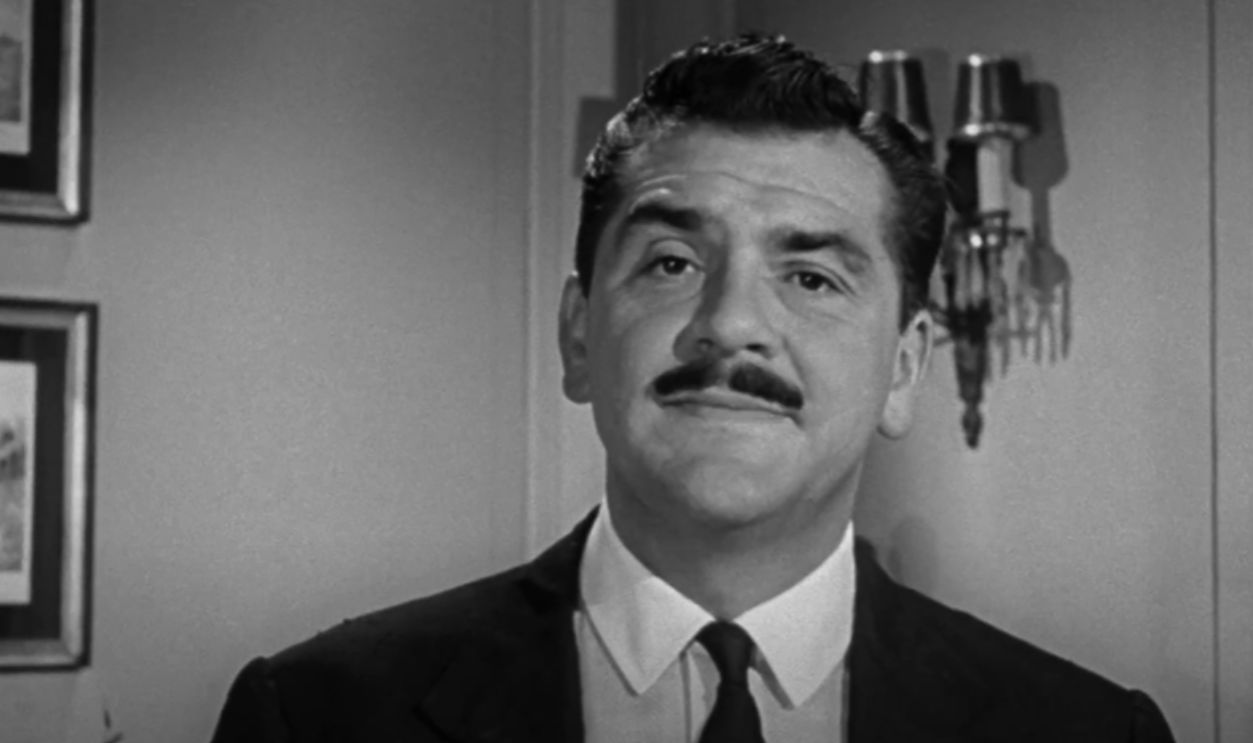 Operation Mad Ball (1957) Original Trailer [FHD], HD Retro Trailers
Operation Mad Ball (1957) Original Trailer [FHD], HD Retro Trailers
36. He Made A Powerful Friend
Once Kovacs was settled in Hollywood, studio boss Harry Cohn came out of the woodwork again. But there was a twist: Rather than taking umbrage at Kovacs’ previous rudeness, Cohn took an interest in the comedian, and helped him get roles in films like Bell, Book and Candle and It Happened to Jane. Before long, Kovacs was making a name as a character actor.
The golden years were here. They just wouldn’t last long.
 John Springer Collection, Getty Images
John Springer Collection, Getty Images
37. He Delighted Audiences
Around this time, Kovacs’ comedic reputation was truly cemented. Aside from his films, he also made guest appearances on television shows, where his quick, absurdist wit was on full display. During the panel show What’s My Line, the “mystery guest” was auto-maker Henry J Kaiser, and one of the clues to his identity was that he was synonymous with a car brand.
Kovacs’ quippy response was: “Are you—and this is just a wild guess—but are you Abraham Lincoln?” Sometimes, though, people joked right back.
38. His Crew Got Revenge
Kovacs loved keeping his crew on their toes with his spontaneity and off-kilter jokes. One day, they gave him a taste of his own medicine. During one show, he was playing magician Matzoh Hepplewhite, who would hit a gong to have his assistant bring him a liquor bottle to drink from. Normally, Kovacs just used iced tea for the skit, but this day the crew replaced it with the hard stuff.
Ever the game comedian, Kovacs didn’t flinch, playing right along and getting quite drunk in the process.
39. He Put On An Unusual Ballet
One of Kovacs’ most famous and memorable gags is surely his funniest. On May 22, 1959, he hosted Kovacs on Music, opening with "I have never really understood classical music, so I would like to take this opportunity to explain it to others". He then proceeded to show a faithful version of the ballet Swan Lake….except the dancers were dressed as gorillas.
But if Kovacs was this good (and he was), why isn’t he better known today? The answer to that is tragic.
40. He Was At The Height Of His Career
At the beginning of 1962, Ernie Kovacs was still on the top of the world. His television and film career was going from success to success, and just three years earlier he’d had another daughter, Mia, this time with his second wife Edie Adams. But in the early morning of January 13, everything was ripped away from him in the blink of an eye.
41. He Got Into A Brutal Crash
That morning, Kovacs was driving his Chevrolet Corvair station wagon in West Los Angeles when he suddenly lost control after taking a turn too quickly. The worst happened. Veering off the road, he hit a power pole at a massive speed, the force throwing him out of the car on the passenger side. He didn’t stand a chance.
42. He Was Gone In An Instant
Unfortunately, Kovacs almost certainly perished instantly after suffering head and chest injuries in his collision with the pole. The comedian was only 42 years old, and left behind three young girls, a loving wife, and a promising career that was only just starting to reach its potential. But for all that, it was about to get even worse.
 Arthur Dark, Wikimedia Commons
Arthur Dark, Wikimedia Commons
43. A Paparazzo Took Advantage Of Him
We now know exactly how Kovacs looked at the moment of his passing, and the reasons for this are utterly macabre. Soon after the crash, a photographer showed up at the scene and managed to snap pictures of Kovacs’ prone body, including the unlit cigar that lay next to his seemingly outstretched hand. Eating it up, newspapers across America then published the photos to announce his death.
But by this time, this was the least of his family’s worries.
44. His Funeral Was Star-Studded
Like Kovacs himself, the mourners at his burial were far from mundane: people like Jack Lemmon and Dean Martin didn’t just attend, they also were Kovacs’ pallbearers. More than that, his influence would be felt for decades afterward, as Kovacs’ absurdist humor influenced everyone from John Cleese and Eric Idle to Chevy Chase.
Yet even during his funeral, Kovacs’ dark secrets were coming out.
 Jim Newberry, Wikimedia Commons
Jim Newberry, Wikimedia Commons
45. He Didn’t Believe In Taxes
Kovacs was an unconventional man, but one of his quirks was ruinous. He staunchly refused to pay most of his taxes, and had been engaged in a cat-and-mouse game with the IRS for years, with Kovacs constantly investing and moving around his money in various paper corporations, one of which he titled “The Bazooka Dooka Hicka Hocka Hookah Company”.
If he’d known what it would do to his family, he may have paid up.
46. He Got In Deep Trouble
In 1961, just before his passing, Kovacs’ evasion finally caught up with him, and the IRS served him with a $75,000 lien. This, in combination with further dodgy investing, meant he was deep in debt on the day of the car crash—debt his widow Edie Adams now had to pay, and which took her years to surmount.
But more dangerous developments were closer at hand.
47. His Ex-Wife Came Back
Soon after the fatal crash, a ghost came back to haunt Kovacs’ family. His first wife Bette Wilcox had never recovered from the sting of losing both their daughters, and she was horrified at the idea of Edie Adams raising her girls now that Kovacs was gone. Accordingly, she tried once more to get custody of Elizabeth and Kip, with heartbreaking results.
48. His Widow Fought Back
In August of 1952, Wilcox went to court, claiming not only custody of the girls but also $500,000 of Kovacs’ estate, or about $5.2 million dollars in today’s money. Edie Adams fought the case with everything she had, submitting an affidavit that Wilcox was still “unfit” to care for the children. But it was the girls themselves who really sealed the deal.
49. His Daughters Made A Wrenching Confession
It had been some years since Elizabeth and Kip had viewed Bette Wilcox as their mother, and their testimony was a tearjerker. They begged the court to stay with Adams, with Kip referring to Adams as “Mommy” and Wilcox as “the other lady”. There was no real winning in a case this sad, but when the verdict came down, it cemented Kovacs’ legacy.
50. His Family Stuck Together
As the case closed, the court ruled in favor of Edie Adams keeping custody of the children, keeping the family she had built with Ernie Kovacs intact. Elizabeth claimed she was “so happy I can hardly express myself” when she heard the news, but Adams was thinking solely of Ernie at this moment. Adams cried and said, “This is what Ernie would have wanted. Now I can smile".
You May Also Like:
The Dark Life Of The Three Stooges
What Really Happened To Ellen DeGeneres?

